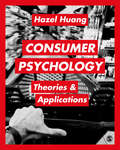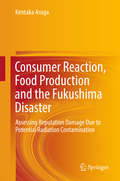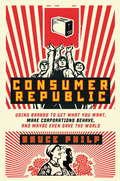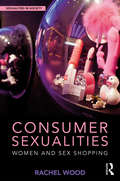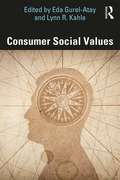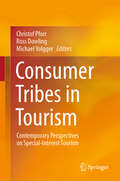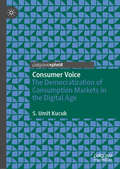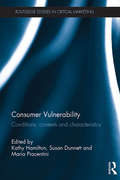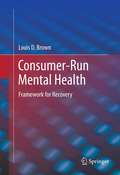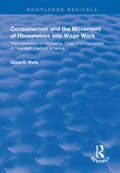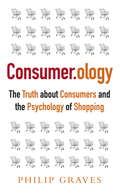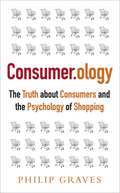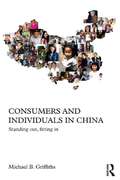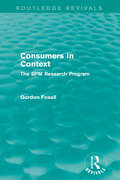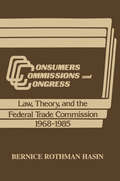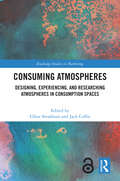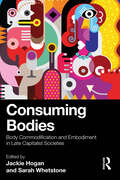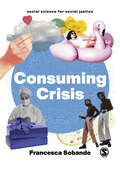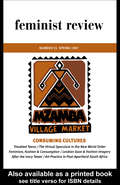- Table View
- List View
Consumer Psychology: Theories & Applications
by Hazel HuangConsumer Psychology: Theories and Applications is the first textbook that systematically discusses a wide range of the psychological theories and their applications in consumer behaviour in an accessible style. The selected psychological theories include both classic theories and contemporary developments, and the applications in consumer behaviour draw from state-of-the-art research underpinned by theories and practical implications. Why are influencers with a smaller number of followers sometimes more effective than the mega influencers? Why are the sounds of brands, such as Coca-Cola and Kit Kat, attractive to consumers? How does music, scent, or lighting influence shoppers? Why can using consumption to boost self-esteem be negative to consumer well-being? Readers will explore these questions and more. This textbook is essential reading for advanced marketing students and also applied psychology students looking at the business world. It includes a chapter on research methods in consumer psychology and can also provide a vital guide for those completing a dissertation project in consumer psychology. Hazel Huang is a Chartered Marketer of the Chartered Institute of Marketing and an Assistant Professor in Marketing at Durham University Business School, UK.
Consumer Psychology: Theories & Applications
by Hazel HuangConsumer Psychology: Theories and Applications is the first textbook that systematically discusses a wide range of the psychological theories and their applications in consumer behaviour in an accessible style. The selected psychological theories include both classic theories and contemporary developments, and the applications in consumer behaviour draw from state-of-the-art research underpinned by theories and practical implications. Why are influencers with a smaller number of followers sometimes more effective than the mega influencers? Why are the sounds of brands, such as Coca-Cola and Kit Kat, attractive to consumers? How does music, scent, or lighting influence shoppers? Why can using consumption to boost self-esteem be negative to consumer well-being? Readers will explore these questions and more. This textbook is essential reading for advanced marketing students and also applied psychology students looking at the business world. It includes a chapter on research methods in consumer psychology and can also provide a vital guide for those completing a dissertation project in consumer psychology. Hazel Huang is a Chartered Marketer of the Chartered Institute of Marketing and an Assistant Professor in Marketing at Durham University Business School, UK.
Consumer Reaction, Food Production and the Fukushima Disaster: Assessing Reputation Damage Due to Potential Radiation Contamination
by Kentaka ArugaThis book examines the factors involved in consumer responses to food produced in regions near the Fukushima Daiichi Nuclear Plant following the March 2011 Eastern Japanese earthquake, and assesses how responses to reports on food safety and risk of radiation contamination shaped consumer perceptions of and subsequent behavior toward products from the Fukushima prefecture. On the basis of a survey conducted in 2014 among 8,000 consumers from all parts of Japan and focusing on ten food products (rice, cucumbers, apples, shiitake mushrooms, beef, pork, eggs, tuna fish, wakame seaweed, and mineral water) it investigates consumer choices specifically based on rumor ("fuyou") and not fact as well as how "fuyou" damage shaped such choices. It then goes on to analyze the differences between these customer choices.
Consumer Republic
by Bruce PhilpConsumer Republic dares you to consider this: The power to save the world lies with the consumer. The foundation of Bruce Philp's message is this single, inarguable truth: Brands make corporations accountable. They are the only leverage the average consumer has with which to make a company behave itself. Expensive to create, essential to making money, and more public than anything else a corporation has or does, a brand is an enormously valuable and fragile asset to them. And we consumers have the power to make it worthless. As someone who has worked on the inside, Philp knows exactly how this power can be made to work for us. Through this book he will inspire you to make every dollar you spend count. To buy less, maybe, but demand better. To make better choices. And then to speak up when you're happy and when you're not. Pin every one of these acts to a brand, Consumer Republic promises, and corporations will be forced to cooperate in making our way of life sustainable. Abandon brands, and we'll surrender the marketplace to scoundrels. Take control of them, and we can save the world.From the Hardcover edition.
Consumer Sexualities: Women and Sex Shopping (Sexualities in Society)
by Rachel WoodConsumer Sexualities explores women’s experiences of shopping in ‘sex shops’ and using sexual commodities in their everyday lives. This enlightening volume shows how women take up sexual consumer ‘technologies of the self’ to work upon and understand themselves as confident and active sexual agents in postfeminist neoliberal culture. In guiding the reader through the historical emergence of sexual commodities ‘for women’ in feminism and postfeminism, Wood points to the normalisation and regulation of sexual practices and identities in and through consumption. Indeed, women’s accounts show the work involved in constructing the ‘right’ – knowledgeable, tasteful, and confident – orientation to sexual consumption and, by extension, in becoming an intelligibly ‘good’ sexual person. At the same time, the author draws upon de Certeau to show how the ordinary contexts in which sexual commodities are used can lead to unpredictable moments of adaptation, discomfort, playfulness, and resistance. A rich analysis of women’s everyday strategies of ‘making do’ with the kinds of femininity and female sexuality that sex shop culture represents, Consumer Sexualities will appeal to scholars of sociology, cultural studies and gender studies with interests in gender, sexuality, sex, and consumption.
Consumer Social Values (Marketing and Consumer Psychology Series)
by Eda Gurel-Atay Lynn R. KahleSocial values are central to people’s lives, guiding behaviors, and judgments, and defining who we are. This book advances understanding of consumer social values and their roles in the global marketplace by refining and directing existing knowledge of consumer behaviors. With a diverse set of contributors from different parts of the world, this engaging collection provides a unique examination of social values through cross-cultural research. It incorporates input from researchers with varying academic backgrounds from marketing to psychology and philosophy, and also focuses on a range of methodological approaches including surveys, ethnography, interviews, semantic analysis, and neuroscience. The book introduces innovative concepts and provides comprehensive coverage of several specialized areas, to offer an important contribution to values research and discussion. Key topics include values and choice; means-end chains; relations among goals; motives; religion and personality; value measurement and values related to specific services and industries. Consumer Social Values is an essential resource for scholars, students, and practitioners of consumer psychology and marketing communications.
Consumer Society: Critical Issues & Environmental Consequences
by Barry SmartWhat factors are contributing to the continuing growth in consumption of goods and services? At what point do the costs associated with consumerism begin to call our way of life into question? How are the problems of resource depletion, waste and pollution, and environmental impact being addressed? What is to be done about the consequences of our all-consuming way of life?<P> Ever-increasing consumption and a relentless pursuit of growth in output are the twin pillars on which the modern economy and contemporary social life rest. But the consumer way of life is globally unsustainable. We can't all live the consumer dream. <P> This comprehensive, lively and informative book will quickly be recognized as a benchmark in the field. It brings together a huge set of resources for thinking about the development of consumer culture, its defining features, and global consequences. <P> Adept in handling a complex range of classical and contemporary theoretical sources, the book draws on an impressive range of comparative material and provides a variety of contemporary examples to inform and enhance understanding of our consuming way of life. Smart writes with verve and feeling and has produced a stimulating book that enlarges our understanding of consumer culture and provides a timely critical analysis of its consequences.<P> Clear, engaging, and original this book will be essential reading for all those interested in and concerned about our global culture of consumption including researchers and students in sociology, politics, cultural studies, economics, and social geography.
Consumer Tribes in Tourism: Contemporary Perspectives on Special-Interest Tourism
by Ross Dowling Michael Volgger Christof PforrThis book adopts a collectivist perspective on special interest tourism consumption, bringing together research on ‘special interest tourism’ and ‘niche tourism’ as well as more recent research into the interdisciplinary applications of the sociological concept of neo‐tribes. It promotes a shift in perspective away from special interest tourism understood as a sum of similarly motivated individuals, to a collective view of special interest tourists who share common characteristics (e.g., shared values, beliefs and mutual interests) and group structures. This approach provides a better understanding of groupings that are not unified by a common tourism motivation, but brought together by otherwise conditioned commonalities in actual behavior triggered by supply-side contexts (e.g., Airbnb). The book considers tourism micro‐segments as consumer tribes (i.e., as symbolic communities) in which individuals are embedded and loosely bound together.As there is limited research on the collectivist perspective on special interest tourism consumption, in the first part the book’s conceptual/theoretical discourse contributes to a better understanding of ‘groupings’ in tourism behavior but also collectives that are not unified by a common tourism motivation. Presenting international examples, the book explores in Part 2 the group culture of a range of tourist tribes by describing emerging tourism micro-segments, identifying shared identities, and analyzing their collective mechanisms.
Consumer Voice: The Democratization of Consumption Markets in the Digital Age
by S. Umit KucukThis book proposes a new type of consumer called a voicing consumer, or a voicesumer. This type of consumer is shaping our markets and marketing interactions with the advent of social networking sites in the digital markets. Described by the author as "real establishment of market democracy," consumer voice is gaining more importance in today's world, especially with the changes in communication technologies in markets. In defining the equalizing and democratic relationship between ordinary consumers and corporations, or any other regular company, the book highlights recent transformative experiences and cases in consumption cultures and consumer behaviors. Current theory discusses new types of consumer complaint behaviors, such as consumer activism and boycott, but this book fills a void by defining how these changes have created a new type of consumer. This new conceptualization of consumer behavior will advance scholarship for consumer behavior, psychology and marketing researchers.
Consumer Vulnerability: Conditions, contexts and characteristics (Routledge Studies in Critical Marketing)
by Kathy Hamilton Susan Dunnett Maria PiacentiniConsumer vulnerability is of growing importance as a research topic for those exploring wellbeing. This book provides space to critically engage with the conditions, contexts and characteristics of consumer vulnerability, which affect how people experience and respond to the marketplace and vice versa. Focussing on substantive, ethical, social and methodological issues, this book brings together key researchers in the field and practitioners who work with vulnerability on a daily basis. Organised into 4 sections, it considers consumer vulnerability and key life stages, health and wellbeing, poverty, and exclusion. Methodologically the chapters draw on qualitative research, employing a variety of methods from interview, to the use of poetry, film and other cultural artefacts. This book will be of interest to marketing and consumer research scholars and students and also to researchers in other disciplines including sociology, public policy and anthropology, and practitioners, policy makers and charitable organisations working with vulnerable groups.
Consumer price index manual: Theory and practice
by International Monetary FundA report from the International Monetary Fund.
Consumer-Run Mental Health: Framework for Recovery
by Louis D. BrownConsumer-run organizations and other types of mental health self-help are becoming increasingly popular in the public mental health system. These initiatives now outnumber traditional mental health organizations in the US (Goldstrom et al., 2006). This growth is due in large part to their low cost, devoted supporters, burgeoning evidence base, and increased acceptance by mental health professionals. International interest in these initiatives is also growing as self-help is flourishing in industrialized countries worldwide. I recently edited a special issue on mental health self-help for the American Journal of Community Psychology and we received submissions from five continents, with exciting work coming out of China, Australia, and Europe. The proposed book develops a rich theoretical model called the Role Framework, which explains how people engage in and benefit from mental health consumer-run organizations (CROs).
Consumerism and the Emergence of the Middle Class in Colonial America
by Christina J. HodgeThis interdisciplinary study presents compelling evidence for a revolutionary idea: that to understand the historical entrenchment of gentility in America, we must understand its creation among non-elite people: colonial middling sorts who laid the groundwork for the later American middle class. Focusing on the daily life of Widow Elizabeth Pratt, a shopkeeper from early eighteenth-century Newport, Rhode Island, Christina J. Hodge uses material remains as a means of reconstructing not only how Mrs. Pratt lived, but also how these objects reflect shifting class and gender relationships in this period. Challenging the "emulation thesis," a common assumption that wealthy elites led fashion and culture change while middling sorts only followed, Hodge shows how middling consumers were in fact discerning cultural leaders, adopting genteel material practices early and aggressively. By focusing on the rise and emergence of the middle class, this book brings new insights into the evolution of consumerism, class, and identity in colonial America.
Consumerism and the Movement of Housewives into Wage Work: The Interaction of Patriarchy, Class and Capitalism in Twentieth Century America (Routledge Revivals)
by David R. WellsFirst published in 1998, this volume explores the connections between the rises in consumerism and the number of married women in paid work in light of the centrality of shopping and consumerism to the modern world. David R. Wells argues for women’s incomplete gains from consumerism through an analysis of married women’s employment, the structure of capitalism and the contradictory requirements of consumerism, the homemaker ideal and gender identity. Through this, Wells demonstrates how the gendered expectations of consumerism became motivating factors for women to join the workforce, resulting in higher standards of living and greater marital power.
Consumerology, New Edition
by Philip GravesPhilip Graves, one of the world's leading experts in consumer behavior, reveals why the findings obtained from most market research are completely unreliable. Whether it is company executives seeking to define their corporate strategy or politicians wanting to understand the electorate, the idea that questions answered on a questionnaire or discussed in a focus group can provide useful insights on which to base business decisions is the cause of product failures, political blunders and wasted billions. Consumer.ology exposes some of the most expensive examples of research-driven thinking clouding judgment, experience and evidence - from New Coke to General Motors, from Mattel to the Millennium Dome - and instances of success through ignoring market research, such as Baileys and Doctor Who. It also shows organizations the tools they should be using if they want to understand their customers. Using his unique AFECT approach, a set of five criteria to evaluate the reliability of any consumer insight, Graves asserts that it's time for a fresh approach that embraces this new understanding of human behavior.
Consumerology: The Truth about Consumers and the Psychology of Shopping
by Philip GravesAvailable in paperback for the first time, this new updated and revised second edition of Consumerology: The Truth About Consumers and the Psychology of Shopping contains a new preface and epilogue, in which Philip Graves reveals the myriad tricks and psychological games high street shops play on consumers; the ways in which we are manipulated into buying things we don't want; the ways in which we deceive ourselves; and the cutting edge behavioural science being used to change our habits to even more significant degrees.
Consumerology: The Truth about Consumers and the Psychology of Shopping
by Philip GravesThis new updated and revised second edition of Consumerology: The Truth About Consumers and the Psychology of Shopping contains a new preface and epilogue, in which Philip Graves reveals the myriad tricks and psychological games high street shops play on consumers; the ways in which we are manipulated into buying things we don't want; the ways in which we deceive ourselves; and the cutting edge behavioural science being used to change our habits to even more significant degrees.
Consumers and Individuals in China: Standing Out, Fitting In (Chinese Worlds)
by Michael B. GriffithsBreaking new ground in the study of Chinese urban society, this book applies critical discourse analysis to ethnographic data gathered in Anshan, a third-tier city and market in northeast China. The book confronts the – still widespread – notion that Chinese consumers are not "real" individuals, and in doing so represents an ambitious attempt to give a new twist to the structure versus agency debates in social theory. To this end, Michael B. Griffiths shows how claims to virtues such as authenticity, knowledge, civility, sociable character, moral proprietary and self-cultivation emerge from and give shape to social interaction. Data material for this path-breaking analysis is drawn from informants as diverse as consumerist youths, dissident intellectuals, enterprising farmers, retired Party cadres, the rural migrant staff of an inner-city restaurant, the urban families dependent on a machine-repair workshop, and a range of white-collar professionals. Consumers and Individuals in China: Standing out, fitting in, will appeal to sociologists, anthropologists, and cultural studies scholars, China Studies generalists, and professionals working at the intersection of culture and business in China. The vivid descriptions of living and doing fieldwork in China also mean that those travelling there will find the book stimulating and useful
Consumers in Context: The BPM Research Program (Routledge Revivals)
by Gordon FoxallThis book, first published in 1996, presents a collection of papers by Gordon Foxall charting the development of the Behavioural Perspective Model (BPM) which he devised in the early 1980s and subsequently developed. The model offers a unique and original behaviour-based theory of consumer choice. In seeking to answer the question ‘where does consumer choice take place?’ by drawing upon behavioural psychology, Foxall presents an exciting challenge to previous theories whose emphasis has been on the internal working of the consumer’s mind in reaching rational decisions and choices. Bringing alive the important subject of economic consumption, this seminal volume will be of great interest to students and researchers in consumer research.
Consumers, Commissions, and Congress: Law, Theory and the Federal Trade Commission, 1968-85
by Bernice Rothman HasinFirst Published in 2017. Routledge is an imprint of Taylor & Francis, an Informa company.
Consuming Atmospheres: Designing, Experiencing, and Researching Atmospheres in Consumption Spaces (Routledge Studies in Marketing)
by Chloe Steadman Jack CoffinAtmosphere is a term often used in everyday life to describe how a consumption space feels and has long been an important theme within marketing. There has been renewed interest in atmosphere over recent years in marketing and beyond, with the concept at a crucial point in its development. However, research about atmosphere is often confined into disciplinary silos. Consuming Atmospheres unsettles such disciplinary boundaries by delivering an interdisciplinary collection of cutting-edge work on atmosphere and consumption. Specifically, the book brings together experts from various disciplinary backgrounds to explore how atmospheres are designed, experienced, and researched. Within these three thematic parts organising the collection, atmosphere is explored across a range of consumption and geographic contexts, including pop-up stores, music festivals, tourist spaces, town centres, sports stadia, amusement arcades, food and drink, urban squats, and seaside piers across England, Scotland, Denmark, and Slovenia. The book will appeal to academics and postgraduate students within marketing and beyond, given the chapter authors have backgrounds in marketing, consumer research, geography, sociology, youth studies, art and design, place management, and law. It may also be of interest to practitioners endeavouring to co-create more effective consumption atmospheres, such as marketers, retailers, and place managers.
Consuming Bodies: Body Commodification and Embodiment in Late Capitalist Societies
by Jackie Hogan Sarah WhetstoneOur bodies reveal the values, priorities, anxieties, and material realities of the society in which we are situated, and in contemporary consumer societies, human bodies both reflect the defining characteristics of our time and carry the markers of social hierarchies based on categories such as gender, race, and class.Consuming Bodies: Body Commodification and Embodiment in Late Capitalist Societies explores the ways our bodies are increasingly commodified, from before birth to after death, through both long-standing forms of commodification (captive labor, sex work, and spectator sports) and newer forms (commercial surrogacy, the thriving trade in human biomaterials, female genital “rejuvenation” surgery, global romance tourism, and green burial practices, among others). As this diverse range of topics demonstrates, body commodification reaches increasingly into every realm of our lives, from our most intimate experiences to encounters with pop culture, the “beauty” industries, the medical-industrial complex, and the state.This volume takes a critical perspective on body commodification and embodiment both in the US and across the globe, making an important contribution to social scientific understandings of the body, both by going beyond the Eurocentric approach that typifies much of the extant scholarly literature, and by addressing newly emerging practices that are growing out of techno-scientific and social changes.
Consuming Crisis: Commodifying Care and COVID-19 (Social Science for Social Justice)
by Francesca SobandeConsuming Crisis is a crucial account of how consumer culture capitalized on Coronavirus (COVID-19). Sobande explores how brands claim to care while they encourage people to ‘keep calm and consume’. This critical analysis of the power and politics of marketing examines an eclectic mix of campaigns, content, and experiences. Such work outlines the societal significance of fast-fashion adverts, banana bread’s pandemic ‘moment’, university social media strategies, and how digital technology mediates memories and work. Based on the belief that brands cannot be activists, Sobande creatively considers how brands construct care, camaraderie, culture, and so-called ‘normal’ life during times of crisis. Francesca Sobande is a Senior Lecturer in Digital Media Studies at Cardiff University
Consuming Crisis: Commodifying Care and COVID-19 (Social Science for Social Justice)
by Francesca SobandeConsuming Crisis is a crucial account of how consumer culture capitalized on Coronavirus (COVID-19). Sobande explores how brands claim to care while they encourage people to ‘keep calm and consume’. This critical analysis of the power and politics of marketing examines an eclectic mix of campaigns, content, and experiences. Such work outlines the societal significance of fast-fashion adverts, banana bread’s pandemic ‘moment’, university social media strategies, and how digital technology mediates memories and work. Based on the belief that brands cannot be activists, Sobande creatively considers how brands construct care, camaraderie, culture, and so-called ‘normal’ life during times of crisis. Francesca Sobande is a Senior Lecturer in Digital Media Studies at Cardiff University
Consuming Cultures: Feminist Review Issue 55
by The Feminist Review CollectiveConsuming Cultures is concerned with the interrelationship of gender and the circuits of consumption, distribution, production and reproduction. The book looks at the ways in which gender intervenes in all parts of the circuit or the linkages between different elements.
